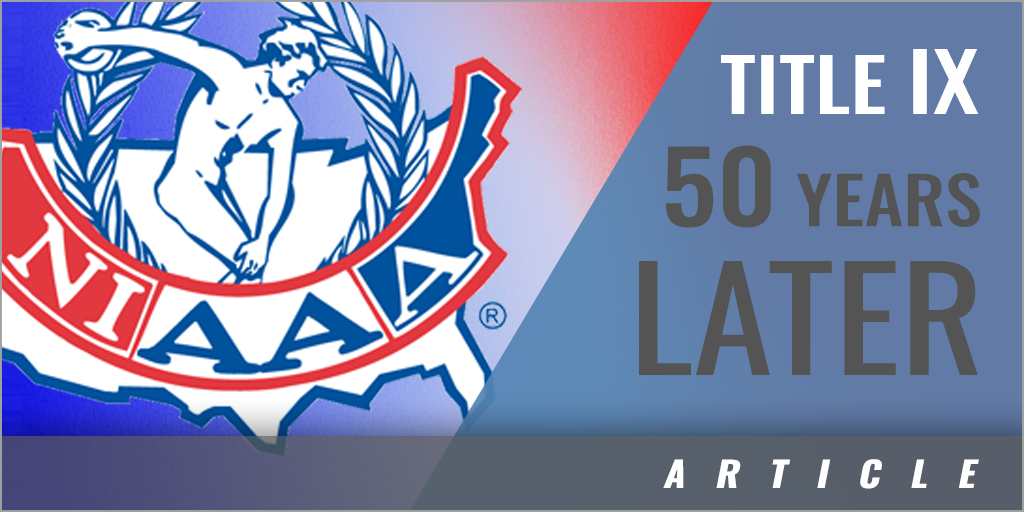|
By: Emily Barkley, CMAA – Oklahoma I was entering my freshman year of college at the height of Title IX in Oklahoma, specifically Northeast Oklahoma. According to the Tulsa World, "beginning in 1996, attorneys Ray Yasser and Sam Schiller combined to file about 20 Title IX lawsuits against Oklahoma public school systems and about 50 others in at least 14 other states." I was 18 years old and did not realize the enormity of what these two attorneys (and all the people involved) were doing and the pathways they were creating, even for myself. Title IX of the Education Amendments Act of 1972 is a federal law that states: "No person in the United States shall, on the basis of sex, be excluded from participation in, be denied the benefits of, or be subjected to discrimination under any education program or activity receiving Federal financial assistance." I was a two-sport athlete in high school. Soccer and basketball filled my time and my heart. I never felt like, as a girl, I was treated differently than my male counterparts. Looking back, I was fortunate to attend a school district that ensured that was the case. After high school, I had opportunities to further my athletic career in college. However, as part of my recruitment visit to the University of Tulsa, a Sports Management professor by the name of Dr. Peggy Smith vowed to me that "we are going to need more women in the sports profession." As I went back home to review all of my options post high school, Dr. Smith's words kept coming back to me. Ultimately, I made the tough decision to end my athletic career and focus on my aspirations of being an athletic administrator. Now 18 years later, here I am as the athletic director of Union Public Schools, the second largest school in the state of Oklahoma. Dr. Smith's words still ring true: we are going to need more women in the sports profession. In 2000, I was awarded the College of Business Outstanding Sports Administration Graduate. I positioned myself to receive one of only a handful of Graduate Assistant positions in the University of Tulsa athletic department where I was fortunate to serve under Judy MacLeod, who was athletic director there for 10 years before becoming the third Commissioner of Conference USA with her appointment on Oct. 26, 2015. She is the first and only female commissioner of a Football Bowl Subdivision athletics conference. Perhaps her attitude and influence helped shape the kind of administrator I wanted to become. When hinting about being the only woman in the room with a seat at the table, MacLeod downplayed the historical significance. "It is about treating everyone with respect. I haven't had a lot of issues or haven't chosen to focus on the ones that have come up through the years. I use my energy to help our student-athletes and our school or conference." - Judy MacLeod, NCAA Champion Magazine As we look to celebrate the 50th anniversary of Title IX of the Education Amendments Act of 1972, I am optimistically reminded of how far we have come. In 2004 at the first conference athletic director's meeting I attended, I was asked if I was the new secretary for the athletic department. Now, in 2021, I recently completed a year of elected service as the Oklahoma Interscholastic Athletic Administrators Association (OIAAA) President, where 86% of the membership are males. We have certainly come a long way. As athletic administrators, it is our duty to apply decisions equitably and provide resources as such among our student-athletes and our sports programs. It is also our responsibility to make sure no students are denied equal educational opportunities, especially through our influence in sports. Furthermore, as a female athletic administrator and member of the NIAAA DEI ad-hoc committee, I am passionate about actively acknowledging, recruiting, and retaining other females and minorities to this profession. The purpose of the NIAAA Diversity, Equity, and Inclusion Ad-Hoc Committee is to provide support, resources, and a pathway to develop and grow underrepresented athletic/activity administrators within the NIAAA. We are committed to intentional acts towards recruiting, fostering, retaining, and celebrating diversity within the organization by recognizing underrepresented individuals and providing opportunities for leadership and belonging. We are committed to equitable access to educational resources, leadership development, and active participation in all organization events. Groups like the NIAAA DEI committee, NOMAD, and the Global Community of Women in High School Sports exist to ensure that women and people of color have equitable opportunities by opening doors to provide "seats at the table." All three of these groups were created within the last two years, which leads us to believe that while progress is being made since Title IX of the Education Amendments Acts of 1972 became a federal law, we still have a ways to go. Like Judy MacLeod paved a path for young aspiring females in 1996, it is my hope to do the same for the next generation of young women, including my 5-year-old daughter who claims she wants to be the next athletic director at Union. |







